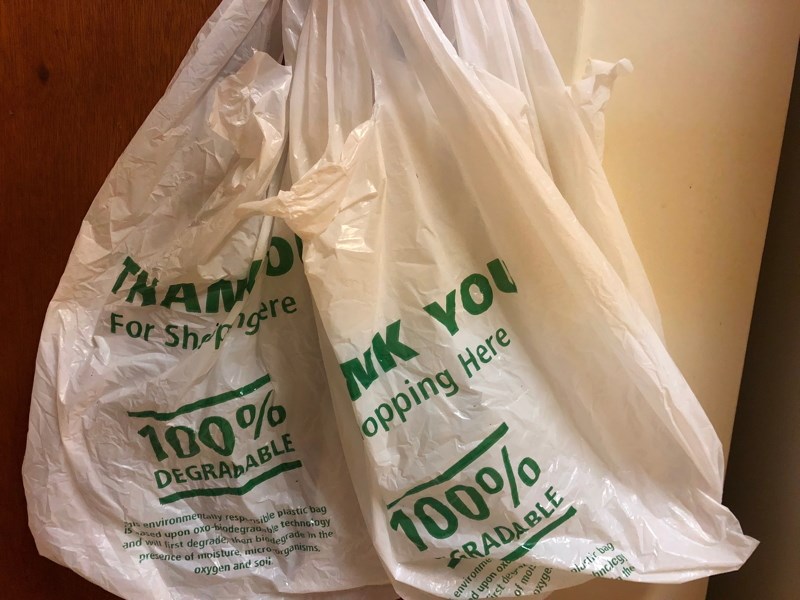A commentary by a retired plastics factory owner who lives at Willis Point. His factory had nothing to do with poly bags.
I was pleased to hear that the B.C. Court of Appeals has struck down Victoria city council’s ban on plastic shopping bags.
While strictly a jurisdictional ruling, it’s a start at ending these very fashionable bag bans. In June 2018 the Texas Supreme Court unanimously ruled that municipalities in that state could not ban plastic shopping bags. Legislatures in Minnesota, Wisconsin, Iowa, Michigan and Indiana have done much the same.
These bans are almost always based on fictitious and contrived environmental data.
One city councillor here called it “absolutely fraudulent rubbish.” I couldn’t agree more.
Canada is one of the cleanest countries in the world. Our contribution to the floating oceanic garbage nightmare is barely measurable. Shopping bags do not litter our landscapes and waterways.
Just look around you. To suggest that we travel to our ocean beaches to discard our plastics is beyond ludicrous.
The plastics debris on our beaches is flotsam from Asia. The great ocean gyres have been dropping it on us for perhaps 30 years.
And we are really lucky, compared with other beaches in the Pacific.
The Surfrider Foundation should be held responsible for the false, misleading and insulting propaganda it spread widely in the lead-up to this bylaw being enacted. And Victoria council, except Coun. Geoff Young, but especially Mayor Lisa Helps and Coun. Ben Isitt should be ashamed of themselves for just “drinkin” their Kool-Aid.
Let’s have a close look at the evil shopping bag. Called a “tee-shirt” bag, it’s made from polyethylene film, and is actually a bit of an industrial marvel.
The poly shopping bag is easily the most useful “free” thing since there were free book matches on every store counter decades ago. Those were of course replaced by cheap, non-refillable, disposable plastic lighters, of which there are now billions in the landfills.
The term “single-use” does not apply to poly shopping bags at all. Because they squish very small, I have clever dispensers for them in my kitchen and my shop.
A tote when you need one. Great for carrying anything you need when you need it, such as books — or your lunch.
They squash so flat, I have one in my back pocket and my wife has a cute little dispenser in her purse.
When we shop at stores that don’t have poly bags, we carry our own.
Methinks most people do not realize that almost all of the plastic bags they buy and use everyday, including shopping bags, are made from the same plastic — polyethylene. In our society, we use hundreds of different types of poly bags. Zip-Loc, shopping, “kitchen catchers’, sandwich, deli, produce and garbage bags are just a tiny few.
Recently, my wife and I counted the poly bags that were involved in one of our average shopping trips to the grocery store. After cruising deli, bakery, produce and bulk foods, we had accumulated 16 poly bags.
We also grabbed a box of 20 Zip-Loc bags making the total 36. At the checkout counter, the clerk asked us if we would like little poly bags for our meat. That brought it to 38. Our groceries were then packed into three paper sacks.
Huh? After acquiring this many poly bags, our stuff cannot be packed into re-usable poly bags as well?
How does the shopping bag alone become such a singular target amongst the myriad bags of the same plastic?
Simple.
It is the only plastic bag that local councils can regulate through bylaw bullying. And the bags are really visible at every checkout counter. It makes for good propaganda.
Garbage bags are a wonder. They answered eons-old questions about how to move garbage — perfectly. In the late 1960s, New York City experimented with poly garbage bags and found they super improved the efficient and hygienic handling of residential garbage.
And in that function, they are made specifically as “single-use” bags. When you compare a garbage bag with a shopping bag, some bylaw silliness starts to appear.
A household garbage bag has five to six times more polyethylene in it than a shopping bag.
Yet only the shopping bag is an environmental problem? Go figure.
In all the anti-bag rhetoric I’ve heard in the past few years, there is one word that is never, ever mentioned: Recycle. There are hundreds of plastics, but we “consume” mainly three. They are polyethylene (PE), polypropylene (PP) and polyethyleneterephthalate (PeT).
All three are perfectly recyclable into something else, and that must be stressed.
Polyethylene or poly is the second most recyclable and recycled plastic after PeT. All (clean) poly bags should be bundled and put in the recycle bin at your grocery store.
Remember, every pound of plastic that is re-used is a pound that doesn’t come out of the ground. As with metals, these plastics can be re-used for durable products such as traffic cones, cargo pallets and rail ties, to mention but a few.
It is incumbent on all of us to manage our “waste” plastics properly.
We can only do that if we have the proper information about them.



